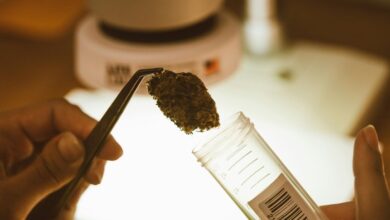
Does Hemp Have Cbd
Hemp is a variety of the cannabis plant that contains cannabidiol (CBD), a compound known for its potential health benefits. Unlike marijuana, hemp has low levels of THC, the psychoactive component. This distinction makes hemp an attractive source for CBD extraction. The growing interest in hemp-derived CBD raises questions about its uses, legal status, and the methods of extraction. What implications do these factors have for consumers and the wellness industry?
Understanding Hemp and Its Components
Although often confused with marijuana, hemp is a distinct variety of the Cannabis sativa plant, primarily cultivated for its industrial applications.
Various hemp varieties exist, each offering unique benefits, such as sustainable fiber for textiles, biodegradable plastics, and nutritious seeds.
These hemp benefits contribute to environmental conservation and economic growth, making hemp an attractive option for industries seeking sustainable alternatives.
The Relationship Between Hemp and CBD
While many people associate CBD (cannabidiol) primarily with marijuana, it is important to recognize that hemp is a significant source of this compound.
Various hemp varieties are cultivated specifically for their high CBD content, offering numerous potential benefits, such as pain relief and anxiety reduction.
Understanding the relationship between hemp and CBD enables individuals to explore natural alternatives for wellness and personal freedom.
Legal Status of Hemp-Derived CBD
The legal status of hemp-derived CBD has evolved significantly in recent years, particularly following the 2018 Farm Bill in the United States, which legalized the cultivation of hemp and the production of hemp-derived products, including CBD.
Consequently, hemp regulations have been updated to reflect this change, enhancing CBD legality across various states.
However, some states still impose restrictions, necessitating awareness of local laws.
Extraction Methods for CBD From Hemp
Extraction methods for CBD from hemp play a crucial role in determining the quality and efficacy of the final product.
Two prominent techniques are solvent extraction and CO2 extraction.
Solvent extraction utilizes solvents to dissolve cannabinoids, while CO2 extraction employs pressurized carbon dioxide to isolate CBD.
Both methods have distinct advantages and challenges, influencing the purity and potency of the extracted CBD.
Conclusion
In conclusion, hemp is a significant source of CBD, offering numerous potential health benefits without the psychoactive effects associated with THC. While some may question the efficacy of hemp-derived CBD compared to other sources, research supports its therapeutic properties, particularly for pain relief and anxiety reduction. As the legal landscape surrounding hemp continues to evolve, understanding its components and the extraction methods can empower consumers to make informed choices about their wellness options.






